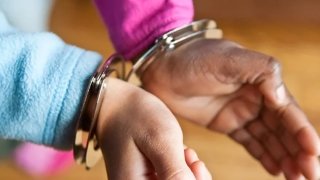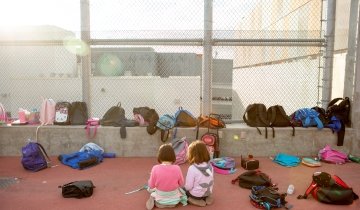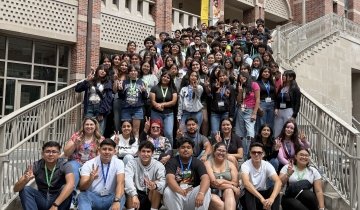Strict school discipline increases the chances of adult arrests.
That’s one key takeaway from a new study that examined the long-term effects of suspensions on middle school students.
The research confirms the school-to-prison pipeline, a term used to highlight the link between exclusionary school discipline and incarceration. Black and Hispanic individuals, who are more likely to be suspended or expelled, are also disproportionately represented in the nation’s prisons.
“Educational opportunities and patience begin to wane once students are marked as ‘bad’ by teachers and school leaders,” said Adrian Huerta, PhD, Assistant Professor of Education at USC Rossier. “'Bad’ kids are slowly pushed out, and expectations are lowered for students’ futures.”
The research findings come as school discipline has received increased national attention.
The Biden administration is considering new rules on student race and school climate. Meanwhile, the pandemic and controversy around school police has led experts to debate punitive campus policies.
Here are some takeaways from experts and research on the role and effects of school discipline.
Behavior can be tied to student needs
Historically marginalized students have been disproportionately affected by the pandemic.
Those who have experienced anxiety or grief may act erratically or be disengaged at school. But punishing them for this behavior could be counterproductive.
“Often when students ‘act out’ in the classroom, they may feel bored, unsupported, or have other hidden challenges that require positive support and attention from educators,” noted Huerta.
A brief by Policy Analysis for California Education (PACE) recommends that, as schools reopen, they should implement positive and restorative discipline practices, stating “Students must feel physically and psychologically safe returning to school, without fear that they will be subject to punitive, exclusionary, and racially or otherwise discriminatory discipline systems and practices.”
Principals can make a big difference
School principals overwhelmingly determine and implement discipline rules, according to the recent study.
Fewer suspensions and expulsions can likely help reduce the school-to-prison pipeline.
But to make a more meaningful difference, principals may need to commit to structural change.
This might include building stronger relationships with communities. Another strategy could be mentoring circles that “provide students access to peers who can help them ‘vent’ about concerns at home or school,” as long as they receive proper training, suggested Huerta.
School police may exacerbate the problem
Research cited by Chalkbeat shows that schools with police have higher rates of suspensions and arrests, particularly among Black students. However, the evidence is inconclusive as to whether police are the cause, or if they are present at schools with more incidents.
“School resource officers are not trained to be student-centered,” said Huerta. Yet, some schools rely on police to manage lower-level conflicts, which has resulted in escalating the problem.
Positive interventions can reduce disruptive behavior
Positive Behavioral Interventions and Support (PBIS) is a framework designed to teach and incentivize good behavior in students.
Unlike traditional approaches to school discipline, it is proactive, supportive and data-driven.
PBIS is used in over 25,000 schools across the nation, and when properly implemented, is shown to reduce behavior problems, improve academic performance and help students manage their emotions.




